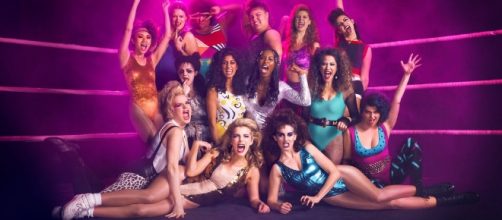"Gorgeous Ladies of Wrestling," in short "Glow," is Netflix’s slam-dunk to HBO’s "Girls." Creators of "GLOW" Liz Flahive and Carly Mensch were inspired by David McLane’s 1980s syndicated women’s professional wrestling circuit and created a fictionalized narrative in "GLOW" to question gender and racial stereotypes. While many shows in the past have attempted to leave a mark in dealing with women’s rights issues and racism in America, none are close to "GLOW" in the implementation of that idea so perfectly.
This comedy-drama series now available to watch on Netflix has ten episodes that show the life of 14 women who come together to take part in a wrestling match for a TV show, produced and directed by men.
The target of the show remains stereotypes whether they are related to gender, race or class but the show creators do it in a subtle manner. One moment you are dancing to '80s beats, another moment you see two women in a KKK costume ready to fight with two black women. It’s wrong on so many levels – but as an audience, you pick your fight and before you realize it, you are part of the show's life.
Women’s wrestling series – What’s that all about?
Wrestling has always been a seen as a masculine domain. If you jog your memory to World Wrestling Entertainment days, you can still remember your heroes ranging from The Heartbreak Kid to The Rock, battle between Kane and the Undertaker, even the current President of the United States Donald Trump was a guest on the show and was beaten up by WWE’s owner Vince McMahon in one of WWE "Raw" episodes.
A show overshadowed by men leaves little room for women. But in the '80s David McLane, while working as a promoter and announcer for the World Wrestling Association, saw the potential in women's wrestling and "GLOW" was born. Starting in 1986,
Starting in 1986, "GLOW" has several strong women characters and comedy sketches which were part of the series. The president of GLOW fan club in Massachusetts described the golden era as, "(GLOW) had an energy none of the other wrestling leagues had. It was a moment in time. You were there and understood it, or you missed it. And I feel sorry for you if you missed it.” The show was produced from 1986 to 1990, lasting four seasons receiving critical acclaim.
Twenty-seven years later, the producer of "Orange is the New Black," Jenji Kohan, produced the revival of this '80s series with the creators of the show.
Why should you watch it?
Because of these women. Women of all shapes and sizes, of all colors and ethnicities, coming together to battle their struggles and weaknesses in this riot of spandex-wearing Amazonian women. Calling them an Amazon is an exaggeration, most women are your next-door neighbors. The beauty of "GLOW" lies in its timing, whether it’s a commentary on stereotypes or plain old catfight. If there is one thing missing from "GLOW," it’s the political correctness. How many times do you watch a show where a Cambodian woman is named a Fortune Cookie, and an Indian girl called Beirut poses with a gun as a terrorist?
These dual personas of your everyday girls make you pause.
The director of the show, although a narcissist, is able to tap into these women’s strengths and bring out their vulnerability in the most powerful way. They wrestle not only with their mind, but you can see the underlying battle of the search for their own identity. This show does not claim to be a feminist agenda, it delivers the message without overdoing it. Maybe Lena Dunham can take some notes on how to do a feminist show right because clearly, the "GLOW" team is doing it right.


